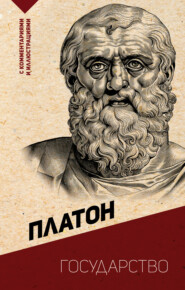По всем вопросам обращайтесь на: info@litportal.ru
(©) 2003-2025.
✖
The Republic
Настройки чтения
Размер шрифта
Высота строк
Поля
Why, yes, he said: how can any reasonable being ever identify that which is infallible with that which errs?
An excellent answer, proving, I said, that we are quite conscious of a distinction between them.
Yes.
Then knowledge and opinion having distinct powers have also distinct spheres or subject-matters?
That is certain.
Being is the sphere or subject-matter of knowledge, and knowledge is to know the nature of being?
Yes.
And opinion is to have an opinion?
Yes.
And do we know what we opine? or is the subject-matter of opinion the same as the subject-matter of knowledge?
Nay, he replied, that has been already disproven; if difference in faculty implies difference in the sphere or subject-matter, and if, as we were saying, opinion and knowledge are distinct faculties, then the sphere of knowledge and of opinion cannot be the same.
Then if being is the subject-matter of knowledge, something else must be the subject-matter of opinion?
Yes, something else.
Well then, is not-being the subject-matter of opinion? or, rather, how can there be an opinion at all about not-being? Reflect: when a man has an opinion, has he not an opinion about something? Can he have an opinion which is an opinion about nothing?
Impossible.
He who has an opinion has an opinion about some one thing?
Yes.
And not-being is not one thing but, properly speaking, nothing?
True.
Of not-being, ignorance was assumed to be the necessary correlative; of being, knowledge?
True, he said.
Then opinion is not concerned either with being or with not-being?
Not with either.
And can therefore neither be ignorance nor knowledge?
That seems to be true.
But is opinion to be sought without and beyond either of them, in a greater clearness than knowledge, or in a greater darkness than ignorance?
In neither.
Then I suppose that opinion appears to you to be darker than knowledge, but lighter than ignorance?
Both; and in no small degree.
And also to be within and between them?
Yes.
Then you would infer that opinion is intermediate?
No question.
But were we not saying before, that if anything appeared to be of a sort which is and is not at the same time, that sort of thing would appear also to lie in the interval between pure being and absolute not-being; and that the corresponding faculty is neither knowledge nor ignorance, but will be found in the interval between them?
True.
And in that interval there has now been discovered something which we call opinion?
There has.
Then what remains to be discovered is the object which partakes equally of the nature of being and not-being, and cannot rightly be termed either, pure and simple; this unknown term, when discovered, we may truly call the subject of opinion, and assign each to their proper faculty, – the extremes to the faculties of the extremes and the mean to the faculty of the mean.
True.
This being premised, I would ask the gentleman who is of opinion that there is no absolute or unchangeable idea of beauty – in whose opinion the beautiful is the manifold – he, I say, your lover of beautiful sights, who cannot bear to be told that the beautiful is one, and the just is one, or that anything is one – to him I would appeal, saying, Will you be so very kind, sir, as to tell us whether, of all these beautiful things, there is one which will not be found ugly; or of the just, which will not be found unjust; or of the holy, which will not also be unholy?
No, he replied; the beautiful will in some point of view be found ugly; and the same is true of the rest.
And may not the many which are doubles be also halves? – doubles, that is, of one thing, and halves of another?
Quite true.
And things great and small, heavy and light, as they are termed, will not be denoted by these any more than by the opposite names?
True; both these and the opposite names will always attach to all of them.
And can any one of those many things which are called by particular names be said to be this rather than not to be this?
He replied: They are like the punning riddles which are asked at feasts or the children's puzzle about the eunuch aiming at the bat, with what he hit him, as they say in the puzzle, and upon what the bat was sitting. The individual objects of which I am speaking are also a riddle, and have a double sense: nor can you fix them in your mind, either as being or not-being, or both, or neither.
Then what will you do with them? I said. Can they have a better place than between being and not-being? For they are clearly not in greater darkness or negation than not-being, or more full of light and existence than being.
That is quite true, he said.
Thus then we seem to have discovered that the many ideas which the multitude entertain about the beautiful and about all other things are tossing about in some region which is half-way between pure being and pure not-being?

















